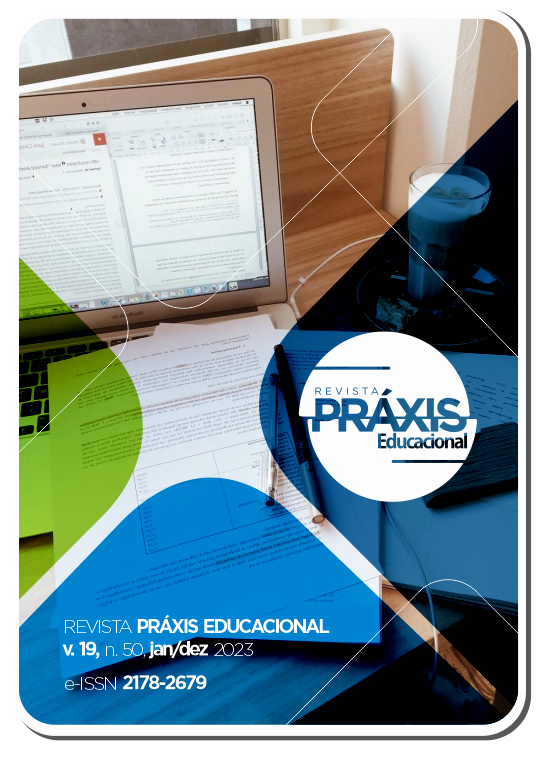Foreground rebuilding: orchestring the future with teachers
DOI:
https://doi.org/10.22481/praxisedu.v19i50.11858Keywords:
teacher, future, learnAbstract
This article studies the concept of foreground present in the literature and reflects on the re-elaboration of the teacher's foreground, especially the aspects that mobilize them to teach and learn. The analysis is based on the understanding that teaching requires constant learning, in which the teacher allows himself to interpret experiences, achievements, desires, dreams, as well as anxieties, barriers and frustrations. The theoretical support is accompanied by authors such as Biotto Filho (2015); Nóvoa (2016, 2022); Skovsmose (1994, 2006, 2007, 2008, 2014, 2018); Tessaro e Bernardi (2019). It is evident that re-elaborating the foreground, in the observation of internal (subjective dimension) and external factors (social dimension), allows human beings to learn to have desire, to give meaning to their personal and professional lives, their conceptions, horizons and visions of future. Looking at the characterizations of the foreground and placing them in the lived context of teaching, it is possible to identify important situations, which refer to reflections and questioning of places that allow this teacher to re-elaborate their foregrounds in a collective way and especially in a “place ” called continuing education. Finally, it is inferred that re-elaborating professors' foregrounds involves reflecting on the way in which a person interprets the possibilities and perspectives present in their context, understanding their desires for the future, objectively, being fundamental to their actions and attitudes.
Downloads
Metrics
References
APOLINÁRIO, Vladinei; BERNARDI, Lucí dos Santos. Os conceitos estruturantes de foreground sob as lentes da pesquisa brasileira. Revista de Ensino de Ciências e Matemática, v. 12, n. 3, p. 1-20, 6 jun. 2021. DOI: 10.26843/rencima.v12n3a37 . Disponível em: https://revistapos.cruzeirodosul.edu.br/index.php/rencima/article/view/2909. Acesso em: 10 jan. 2022.
BACKGROUND. In: DICIO, Dicionário Online de Português. Disponível em: https://www.dicio.com.br/background/. Acesso em: 15 jan. 2022.
BIOTTO FILHO, Denival. Quem não sonhou em ser um jogador de futebol? Trabalho com projetos para reelaborar foregrounds. 2015. 234 f. Tese (Doutorado em Educação Matemática) - Instituto de Geociências e Ciências Exatas da Universidade Estadual Paulista,
Rio Claro, 2015.
D’AMBROSIO, Ubiratan. Etnomatemática. Elo entre as tradições e a modernidade. Belo Horizonte: Autêntica, 2007.
IMBERNÓN, Francisco. Formação continuada de professores. Tradução: Juliana dos Santos Padilha. Porto Alegre: Artmed, 2010.
NASCIMENTO, Carolina Azevedo França do. Nós enquanto nós: aprendizagem por projetos e educação crítica. 2018. 227 f. Dissertação (Mestrado Profissional em Ensino em Educação Básica) - Universidade do Estado do Rio de Janeiro, Rio de Janeiro, 2018.
NÓVOA, António. Cinco pontos para qualificar a formação docente. Centro de Referências em Educação Integral, publicado em 29/07/2016, por Ana Luíza Basílio. Disponível em: http://educacaointegral.org.br/reportagens/veja-cinco-pontos-para-qualificar-formacao-docente-segundo-antonio-novoa/. Acesso em: 16 fev. 2022.
NÓVOA, António. Escolas e professores – proteger, transformar, valorizar. Salvador: SEC/IAT, 2022.
SCHÖN, Donald. Educando o profissional reflexivo: um novo design para o ensino e a aprendizagem. Tradução: Roberto Cataldo Costa. Porto Alegre: Artmed, 2000.
SKOVSMOSE, Ole. Towards a philosophy of critical mathematics education. Dordrecht: Kluwer Academic Publishers, 1994.
SKOVSMOSE, Ole. Foreground dos educandos e a política de obstáculos para aprendizagem. In: RIBEIRO, José Pedro Machado et al. (org.). Etnomatemática: papel, valor e significado. 2. ed. Porto Alegre: Zouk, 2006. p. 103-122.
SKOVSMOSE, Ole. Educação crítica: incerteza, matemática, responsabilidade. São Paulo: Cortez, 2007.
SKOVSMOSE, Ole. Um convite à educação matemática crítica. Campinas, São Paulo: Papirus, 2014.
SKOVSMOSE, Ole. Interpretações de significado em educação matemática. Bolema. Rio Claro, v. 32, n. 62, p. 764-780, dez. 2018. DOI: 10.1590/1980-4415v32n62a01
Disponível em: https://www.scielo.br/j/bolema/a/ZjCDBBqhjvJXQ5vHrjkSC3R/?lang=pt. Acesso em: 20 jan. 2022.
SKOVSMOSE, Ole. Desafios da reflexão em educação matemática crítica. Campinas: Papirus. 2008.
SKOVSMOSE, Ole; ALRØ, Helle; VALERO, Paola; SCANDIUZZI, Pedro Paulo. “Antes de dividir temos que somar”: ‘entre-vistando’ foregrounds de estudantes indígenas. Bolema, Rio Claro, v.34, 2009, p. 237-262. Disponível em: https://www.periodicos.rc.biblioteca.unesp.br/index.php/bolema/article/view/3306. Acesso em 13 de jul. 2022.
SKOVSMOSE, Ole; SCANDIUZZI, Pedro Paulo; VALERO, Paola; ALRØ, Helle. A aprendizagem matemática em uma posição de fronteira: foregrounds e intencionalidade de estudantes de uma favela brasileira. Bolema, Rio Claro, v. 26, n. 42a, p. 231-260, abr. 2012. DOI: 10.1590/S0103-636X2012000100011. Disponível em: https://www.scielo.br/j/bolema/a/DGFDG8ffWwJNbWJ6DR4nGdN/?format=html. Acesso em: 25 jan. 2022.
TESSARO, Mônica. Jovens olhares sobre a escola: vivências dos processos educativos a partir do background e do foreground. 2018. 166 f. Dissertação (Mestrado em Educação) - Universidade Comunitária da Região de Chapecó (Unochapecó), Chapecó, 2018.
TESSARO, Mônica; BERNARDI, Lucí dos Santos. O futuro pode ter muitos nomes: significando o foreground. Revista Práxis Educacional, Vitória da Conquista, v. 15, n. 36, p. 415-432, 2019. DOI: 10.22481/praxisedu.v15i36.5898. Disponível em: https://periodicos2.uesb.br/index.php/praxis/article/view/5898. Acesso em: 20 jan. 2022.
TUAN, Yi-Fu. Espaço e lugar: a perspectiva da experiência. Tradução: Lívia de Oliveira. São Paulo: Difel, 2014.
Downloads
Published
How to Cite
Issue
Section
License
Copyright (c) 2023 Práxis Educacional

This work is licensed under a Creative Commons Attribution-ShareAlike 4.0 International License.
You are free to:
Share - copy and redistribute the material in any medium or format; Adapt - remix, transform, and build from the material for any purpose, even commercially. This license is acceptable for Free Cultural Works. The licensor cannot revoke these freedoms as long as you follow the terms of the license.
Under the following terms:
Attribution - You must appropriately give credit, provide a link to the license, and indicate if any changes have been made. You may do so in any reasonable way, but not in a way that suggests that you or your use is endorsed by the licensor.
There are no additional restrictions - You cannot apply legal terms or technological measures that legally restrict others to make any use permitted by the license.










